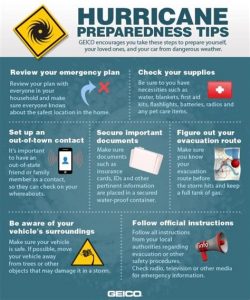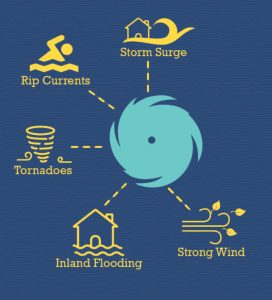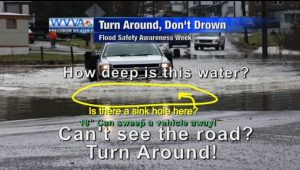Hurricane Awareness: Are You Ready?
Hurricane season is upon us and you should have a plan if disaster strikes. Hurricane season started in June and will end in November in the Atlantic. Hurricane season sharply peaks from late August through September. Knowing your zone and making preparations can help keep your family and belongs safe. You should know what to do before, during, and after a hurricane. The key thing to do first is watch the news and check weather sources constantly to keep informed. Below are some key items to have when a hurricane is coming your way.
● Know your area
● Gather tools and supplies
● Make sure you have a full tank of gas
● Make arrangements for your pets
● Secure your property
● First aid kit
● Important Documents
● Medications

Hurricanes are dangerous and can change your life in an instant. If you are told to evacuate, don’t take that information lightly. Hurricanes come with damaging winds, storm surge, heavy rain, flooding, and possible tornadoes. Grab your Hurricane supplies and get to a safer location. If you can’t find a safer location, check your area for shelters to hunker down. If you decide to stay home and wait out the storm, take precautions such as, bringing in all outdoor furniture and clearing the lawn, securing windows with storm shutters, securing rooftops with straps and seal all doors and windows. Most importantly make sure you have plenty of food, water, and supplies for at least 72 hours.

After a hurricane hits, make sure it is safe from local officials. Even though a hurricane has passed, there still may be danger lurking about. More injuries and deaths happen after the hurricane. Damage has been made and areas may be flooded. That saying, “Turn around, Don’t drown”, couldn’t be more than the truth. Don’t underestimate water, especially if it’s moving water. It only takes 6 inches of water to knock a person over and reach the bottom of most passenger cars and cause problems. Stay away from puddles, trees, and anything near broken power lines. Powerlines can carry around 500,000 volts and can easily injure or kill a person. Take caution when entering buildings or homes with structural damage. You have insurance for a reason, use it. Take pictures of the damage and have your insurance company take care of the rest to assure that your property is safe to enter.

The National Weather Service says “Two keys to weather safety are to prepare for the risks and to act on those preparations when alerted by emergency officials”. You can get information on evacuation routes and a guide to hurricane preparedness at local hospitals, American Red Cross, Emergency Management Offices and tv/radio stations. Hurricanes leave a path of destruction and you can feel the aftermath for a while. Always be prepared and keep informed while hurricanes are in sight. The key is to be ready and stay safe. Always keep your guard up and never assume you are safe. Listen to what the local officials are saying and act accordingly.


You must be logged in to post a comment.